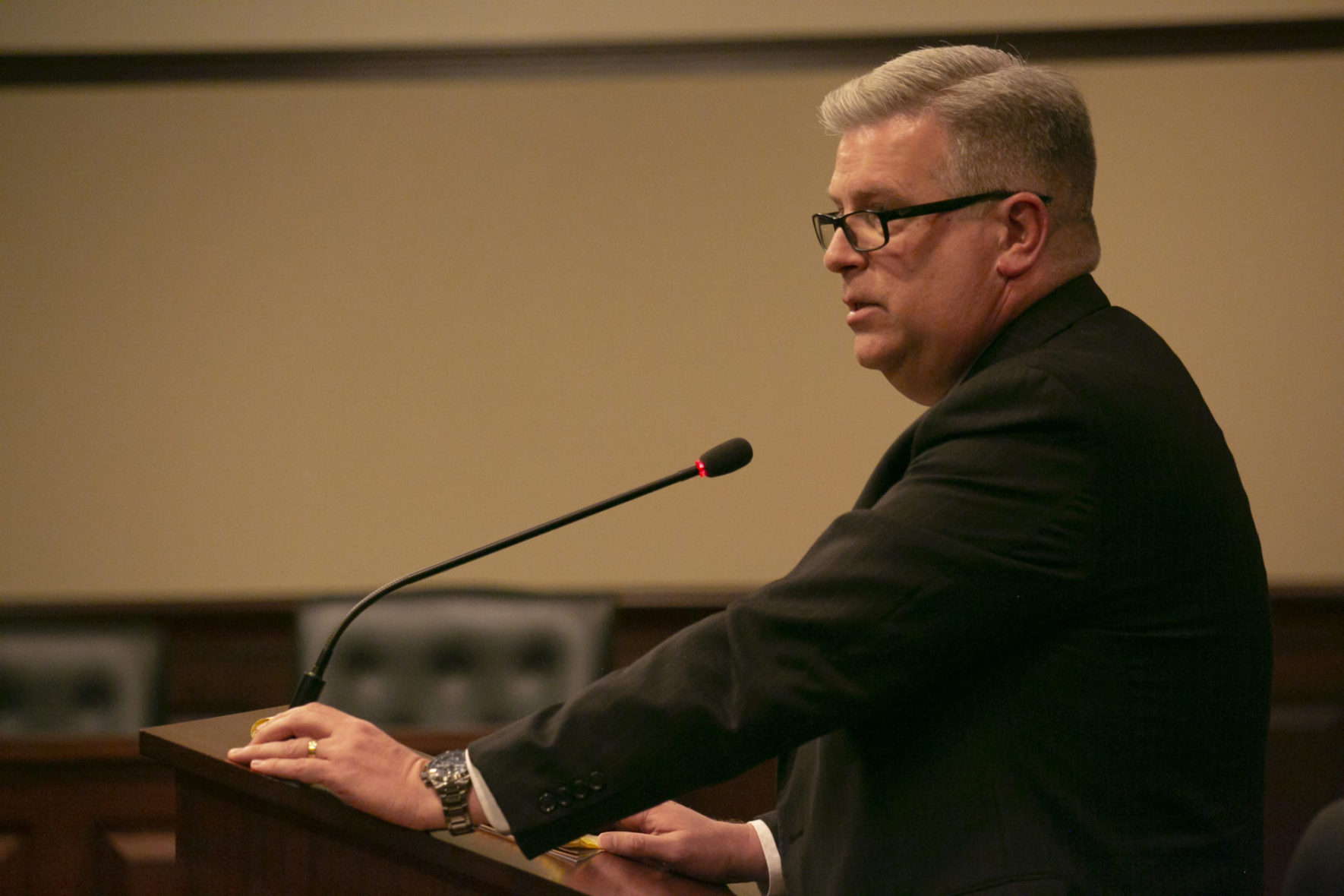Senators voted down a guns-in-schools bill Friday, effectively stopping the proposal for 2020.
The split Senate State Affairs Committee vote came after another day of divided testimony. Second Amendment advocates pushed for Senate Bill 1384’s passage, while law enforcement officials testified against it.

Sponsored by Sen. Todd Lakey, R-Nampa, SB 1384 would have done several things. But the crux of the bill — and this week’s debate — centered on the idea of allowing any employee with an enhanced concealed weapons permit to carry a gun on school grounds. The employee would have to notify school officials, who in turn had the option of notifying law enforcement.
While gun-control advocates had their turn testifying against SB 1384 Wednesday, Friday’s hearing was designed to give supporters their turn before the committee.
One speaker was Bailey Nielsen, an 11-year-old student at West Ada’s Christine Donnell School of the Arts.
“How can you propose to protect me if my teacher can’t?” Nielsen asked senators.
“I think your question almost answers itself,” said Sen. Kelly Anthon, R-Burley.
But senators also heard from law enforcement officials. And like the education lobbyists who testified Wednesday, law enforcement came out against the bill. Training — or lack of training — was law enforcement’s overriding issue.
“One-and-done training for an enhanced weapons permit is not going to cut it,” said Meridian police chief Jeff Lavey, testifying on behalf of fellow police chiefs.
Vaughn Killeen, the executive director of the Idaho Sheriffs Association, said the bill would leave school officials with no options; they would have to allow an undertrained “goofball employee” to carry a gun on school grounds. “You may be a little bit concerned about their core judgment,” Killeen said.
Lakey said the state’s enhanced concealed weapons holders are “the most responsible of the most responsible.” He predicted that many employees would seek out training themselves, before bringing a firearm to school.
When it came time for the committee to vote, training issues were clearly on senators’ minds.
Sen. Mary Souza, R-Coeur d’Alene tried to send the bill to the Senate floor for amendments — in hopes of addressing the training issue. No senator seconded her motion.
Later, Senate President Pro Tem Brent Hill, R-Rexburg, and State Affairs Chairwoman Patti Anne Lodge, R-Huston, lamented the lack of a training component. A former teacher, Lodge said she could not support the bill without added training requirements.
A motion to send SB 1384 to the Senate floor failed on a 4-5 vote. Souza, Lodge and Hill joined Democrats Michelle Stennett of Ketchum and Troy Rohn of Boise in opposition. (Rohn, a Boise School District trustee, was substituting Friday for Sen. Cherie Buckner-Webb, D-Boise.)
House passes most K-12 budget bills
Moving a few steps closer to adjournment, the House passed a string of K-12 funding bills on Friday afternoon.
Lawmakers break up the K-12 budget into seven separate bills. The House passed six of the seven, and they will go to the Senate next.
Taken together, the six budget bills account for the bulk of the $1.9 billion spending plan for K-12, which passed the Joint Finance-Appropriations Committee last week.
The budget bills include several key line items:
- $24 million for teacher salaries, designed to align the employee counts in each cell of the career ladder salary plan. Another $6 million would increase minimum teacher salaries, funding the second phase of a two-year effort to increase the minimum salary to $40,000.
- $11.5 million to cover projected enrollment growth.
- $7.4 million to help cover the cost of health insurance.
- $26.1 million for Idaho’s K-3 literacy initiative. The budget converts $3.1 million from last year’s literacy budget from one-time spending to permanent spending.
- A $2 million increase for the advanced opportunities program.
- $1 million for professional development that districts and charters could use toward training or resources to support social-emotional learning.
The House did not act on one of the seven bills: a $102.2 million proposal to cover administration costs.
Both houses are passing agency spending bills — an essential step toward adjourning the 2020 session. But several key pieces are in flux. JFAC wrote a new higher education budget Thursday, replacing the budget the House killed Monday, and this bill still needs to pass both houses. Both houses also need to pass a budget for state superintendent Sherri Ybarra’s office — a controversial proposal that shifts 18 full-time positions from Ybarra’s office to the State Board of Education.
Master educator premiums
Without any debate, the House Education Committee unanimously advanced a bill Friday to phase out the master educator premium program.
Pushed by Gov. Brad Little’s staff, House Bill 624 would make several changes:
- It would allow the state to accept one final round of master educator premium applications this year. After this year, no new applications would be accepted.
- It would allow the state to continue paying out premiums for teachers who earned them last year and earn them this year.
- Then it would repeal the program by July 1, 2024.
Created by the Legislature, master educator premiums are a $4,000 annual financial incentive designed to reward Idaho’s most experienced, highest performing teachers.
Little’s staff said his five-year, $223 million plan to increase salaries for veteran teachers is replacing the premiums.
HB 624 next heads to the House floor with a recommendation it pass.
Idaho Education News reporter Clark Corbin contributed to this article.
